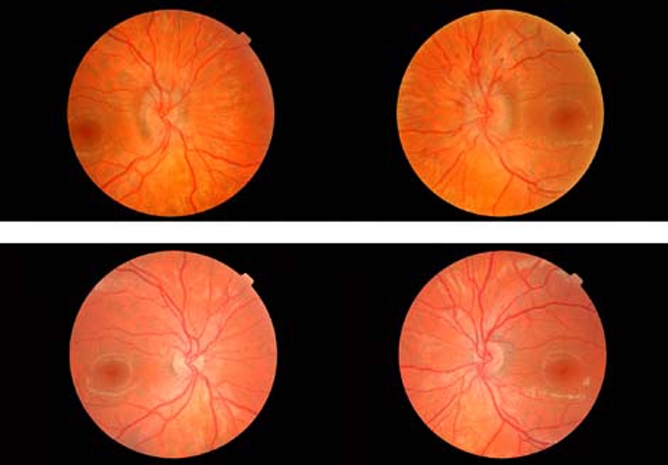Abstract
Asymptomatic bilateral optic disc swelling was detected in a 19-year-old man with type 1 diabetes through routine photographic screening for retinopathy. He was found to have significant vitamin B12 deficiency which the authors believe was the cause for the optic neuropathy. After B12 replacement, visual function and optic disc appearances returned to normal.
Background
This is the first case of asymptomatic B12 deficiency optic neuropathy detected through a screening programme. It is important to highlight the potential for screening programmes to detect coincidental pathology. B12 deficiency is also a crucial cause of optic neuropathy not to miss as it is easily treatable and will otherwise lead to progressive, severe visual loss. The fundal photographs also nicely demonstrate the resolution of disc swelling.
Case presentation
A 19-year-old man with type 1 diabetes was referred with bilateral optic disc swelling which was detected through routine photographic screening for diabetic retinopathy (figure 1 – upper row). He had no visual or neurological symptoms, but gave a history of malaise. The remaining examination was unremarkable, with no evidence of peripheral neuropathy in particular. The patient smoked 10 cigarettes per day and only occasionally drank alcohol. There was also no history of drug ingestion. His diabetic control was acceptable with an HbA1c of 7.1% and there was no evidence of retinopathy.
Figure 1.

Bilateral optic disc swelling identified by diabetic retinopathy screening photographs (upper row) which resolved 3 months after commencing vitamin B12 replacement (lower row).
Investigations
Best corrected visual acuity was 6/12 right eye and 6/9 in the left with no field defects on static perimetry. Visual evoked potentials showed marginal delay to 113 ms on the right with a 107 ms result on the left. Serum B12 was found to be low at 52 ng/l (180–1000 ng/l), as was serum folate at 1.9 μg/l (>3 μg/l) and the patient had a resulting macrocytic anaemia (haemoglobin (Hb) – 9.9 g/dl, mean cell volume – 111.2 fl).
MRI demonstrated normal optic nerve appearances and no evidence of raised intracranial pressure. Intrinsic factor, tissue transglutaminase antibodies and a duodenal biopsy were negative. On detailed questioning, however, there was a history of dietary restriction and red meat avoidance which may have contributed to the B12 deficiency.
Treatment
Five intramuscular injections of 1 mg hydroxycobalamin were given over a 2-week period and folate supplementation started.
Outcome and follow-up
Within 3 months, there was complete resolution of the disc swelling (figure 1 – lower row), visual acuity improved to 6/6 in both eyes and all blood tests returned to normal levels. He continues to receive vitamin B12 replacement.
Discussion
There are only a handful of reports in the literature describing vitamin B12 deficiency associated optic neuropathy and this is the first detected through a screening programme. While no clear aetiology was identified in this patient, reported causes include pernicious anaemia,1 post small bowel resection2 and parasitic infestation.3
B12 deficiency should be considered in all cases of optic neuropathy because early intervention can prevent irreversible visual loss and optic atrophy.4 A degree of asymptomatic disease may occur even in patients with known B12 deficiency and so optic disc examination should be considered at diagnosis. In this patient, detection of other eye disease was an additional benefit of the National Diabetic Retinopathy Screening Programme.
Learning points.
-
▶
The English National Diabetic Retinopathy Screening Programme frequently detects other ocular pathology aside from diabetic retinopathy.
-
▶
This is the first reported case of asymptomatic B12 deficiency optic neuropathy detected by a screening programme.
-
▶
B12 deficiency is an important cause of optic neuropathy as it is easily treatable and resulting visual loss is potentially reversible.
Footnotes
Competing interests None.
Patient consent Obtained.
References
- 1.Foulds WS, Chisholm IA, Stewart JB, et al. The optic neuropathy of pernicious anaemia. Arch Ophthalmol 1969;82:427–32 [DOI] [PubMed] [Google Scholar]
- 2.Areekul S, Roongpisuthipong C, Churdchu K, et al. Optic neuropathy in a patient with vitamin B12 deficiency: a case report. J Med Assoc Thai 1992;75:715–18 [PubMed] [Google Scholar]
- 3.Björkenheim B. Optic neuropathy caused by vitamin-B12 deficiency in carriers of the fish tapeworm, Diphyllobothrium latum. Lancet 1966;1:688–90 [DOI] [PubMed] [Google Scholar]
- 4.Larner AJ. Visual failure caused by vitamin B12 deficiency optic neuropathy. Int J Clin Pract 2004;58:977–8 [DOI] [PubMed] [Google Scholar]


